"Remember to say hello to your team, and praise them for good work." Does your manager visit your construction projects? How often? What do they do when they’re on the projects? When I was a construction project director and later the general manager of a construction division I tried to get to my projects as often as I could. Unfortunately, some were distant from our Head Office, and it took a full day or more to visit. However, I always enjoyed visiting my construction projects as it gave me an opportunity to connect with my construction team and our customers. I also know I regularly added value to the construction project with these visits. In particular I tried to attend some of the project meetings with the customer. Often minutes or notes from these meetings are sterile and don’t provide the true vibe between the construction team and customer. Attending these meetings enabled me to better understand the relationship between the customer and our construction team and detect any underlying tensions. construction project meetings with your client Of course, some managers are renowned for paying flying visits to a construction project, rushing around the project and criticizing the work. In some quarters they are known as seagulls. I guess we all know what can happen when a seagull flies overhead at the wrong time – it can be messy. Often these visits don’t achieve much and sometimes only serve to demoralize the construction team. Then there are other managers who visit their construction projects and spend the duration of the visit on their phones and computers, worrying about other projects. How do these visits help the construction team? 12 important phrases to use in construction "Are you adding value when you visit your construction projects?" 7 reasons managers should visit their construction projectsHere’s why I think it’s important for managers to regularly visit their construction projects:
Adding value to your construction projectsVisiting the construction project provides managers a better understanding of the project, they may see problems developing before the construction team sees them, or help the construction team solve problems, it also provides an opportunity to meet the customer and possibly find leads for future construction projects. Care should be taken that these visits aren’t rushed and distracted as it’s easy to quickly go through a construction project, missing potential problems and achieving little. It’s also essential that these visits don’t just become negative and critical visits which can demoralise staff without adding value – managers should avoid being seen as that pesky seagull that flies in and rushes home leaving only a nasty reminder of their visit. Did you make a difference on your construction project today? This article was first published on the ClockShark website - Get The Industries' #1 Time-Tracking AppRunning a field service or construction business takes coordination and a great team. With ClockShark you get the industries' #1 timesheet ap Learn more about Construction Project Management"This book helps with practical tips learned from real experiences. A must read book for the people who are involved in construction projects, especially project managers." To read more about the author’s books and find out where you can purchase them visit the pages on this website by clicking the links below:
'Successful Construction Project Management: The Practical Guide' 'Building a Successful Construction Company: The Practical Guide' 'Construction Claims: A Short Guide for Contractors' 'Construction Book reviews' To read more about the author visit the page 'Paul Netscher' Want to contact Paul Netscher please enter your details on 'Contacts' Find out how Paul Netscher can help you Order your books from Amazon Order your books from Amazon UK © 2016 This article is not to be reproduced for commercial purposes without written permission from the author.
0 Comments
"Construction equipment is expensive to hire and operate but careful management will reduce these costs." Most construction projects hire construction equipment. Sometimes these costs can form a significant portion of the project costs. Say a construction project’s equipment rental costs make up 40% of the project’s total costs then just saving 5% of these costs could translate to an additional 2% or more profit. That doesn’t sound like a lot of money, but many construction projects only make 10% profit so an extra 2% of profit means the project will make 12% profit which is an increase of 20%. Wouldn’t the bosses be pleased with that? But put some of these tips into practice and you could find the savings are even larger – resulting in even bigger profits. In this article I discuss some ways that you could save money on equipment rentals on your construction project. Pass these tips to your construction team. Ordering construction equipment
Construction equipment rental paperwork"The rental or hire agreement is a contract between you and the rental company. Understand what the contract says and read the fine print." Check the rental agreement and paperwork to ensure that:
When construction equipment arrives on the project siteIt is important to check construction equipment when it arrives on the project. This includes:
"Check construction equipment before it is off loaded on the project." Operating construction equipment efficiently
"Ensure your construction equipment is used productively. Equipment standing idle costs money." When the construction equipment has finished the task
"More valuable tips that will make your construction projects more profitable. These great books are available from Amazon and other stores." Make your construction project more profitableIt is important that the construction team understands the cost of equipment and ensure that it is properly looked after and operated by competent operators, that it is used productively and is put off hire when it is no longer required. Equipment costs contribute significantly to the overall cost of the construction project. Reducing these costs will improve your project’s profit. If you found this article useful please like it and share it with your team and connections. Please like and share this article. Learn more about Construction Project ManagementThis article is adapted from information in the author’s popular books: 'Successful Construction Project Management: The Practical Guide' and 'Building a Successful Construction Company: The Practical Guide'.
'Construction Claims: A Short Guide for Contractors' has just been published. These books are available on Amazon and other online book stores. Paul publishes articles regularly on LinkedIn and his website. Paul writes regular articles for other websites, gives lectures, mentors, and is available for podcasts and interviews. © 2016 This article is not to be reproduced for commercial purposes without written permission from the author.  Image courtesy of Sira Anamwong at FreeDigitalPhotos.net Image courtesy of Sira Anamwong at FreeDigitalPhotos.net Frequently construction projects end in lengthy and acrimonious disputes between the owner and the contractor, or between the general contractor and their subcontractors. Construction projects will inevitably have changes, delays and variations. Where these are as a result of the client or owner’s actions, or due to some other actions which the contractor had no control of and couldn’t avoid, then the contractor, depending on the terms of the contract document, will have reason to claim for an extension of time caused by the delay and for the additional costs they incurred as a result of the variation. Unfortunately often these claims are refuted due to them not being legitimate, or because they weren’t submitted in terms of the contract or because they are incomplete and don’t have the necessary supporting documentation. However, sometimes the claims are rejected for the wrong reason. This might include the party that rejects the claim not understanding the claim, possibly not understanding the contract, or, in some cases purely because they believe they can bully the contractor into withdrawing their claim. Where the parties cannot agree the legitimacy or the quantum of the claim then the aggrieved party may declare a dispute. Why disputes are bad Where possible disputes should be avoided because they: 1. Are time consuming – contractors shouldn’t underestimate the time that disputes take to resolve - time that could be better utilised elsewhere on the construction project, or on other projects. 2. Can damage the construction company’s reputation – clients/customers and subcontractors often avoid contractors that have a reputation for project disputes. 3. Damage the relationship between the parties – the relationship seldom returns to normal after a dispute. 4. They are costly especially when they become legal and involve lawyers. 5. They may end poorly for the contractor who doesn’t receive the full value of their claim. 6. They can disrupt the construction project and sometimes cause further problems. How to avoid disputes Generally most disputes can be avoided if appropriate actions are taken, such as ensuring: 1. There’s a legally enforceable contract in place which protects both parties’ interests. 2. The contract is well written and doesn’t have conflicting clauses or contractual loopholes. 3. The contractor understands the contract and complies with its provisions. Often the contractor’s Project Manager doesn’t read the contract until a dispute arises – it’s normally too late then! 4. The contractor communicates with the client and their own subcontractors, timeously notifying them when problems, delays and variations arise. 5. The contractor submits and resolves variations as soon as practical. 6. Clients act in a fair and reasonable manner. 7. Accurate records are maintained. 8. There’s willingness by the parties to talk and negotiate. 9. Personalities and emotions are kept out of the negotiations. 10. The contractor admits when they’re wrong and doesn’t lodge extravagant claims. 11. The consequences of escalating the dispute are weighed up carefully, since the costs of legal action may be more than the outcome is worth. 12. The construction contract is administered in a spirit of honesty and cooperation by all parties. 13. Senior management are made aware of potential disputes and problems on a project, thus enabling them to take the necessary action and intervene if required to avoid the problem escalating. 14. Expert advice is sought when necessary. 15. The contractor deals with their subcontractors and suppliers fairly and resolves claims when they arise. Negotiating a claim successfully Being able to negotiate is a skill that’s essential to successfully agreeing claims. There are many useful courses about negotiations. Negotiating is often a slow process and the success depends on: 1. Understanding the strengths and the weaknesses of the claim. 2. Being able to support the strengths of the claim with relevant documentation. 3. Being able to defend the weak points of the claim, but always ensuring that supporting a weakness isn’t done at the expense of credibility. 4. Understanding the other party’s arguments and having the facts to explain why they are incorrect. Take time to go through every argument even if you consider the points irrelevant or trivial. 5. Keeping emotions out of arguments. Even if the other party becomes personal or abusive it’s important to stay calm and stick to the facts. 6. Presenting arguments in a logical fashion. 7. Being prepared to grant the other party small wins. 8. Understanding the other party’s fears or concerns which will enable these fears to be addressed, pointing out why these fears are unnecessary, or presenting arguments that will allay the fears. 9. Learning to admit when you are wrong. Defending a claim, or part of a claim, with flimsy arguments wastes time, impacts integrity and frustrates the other party, even undermining any partial wins already negotiated. 10. Knowing what the ‘walk-away’ point is – what is the absolute minimum that can be accepted. When this point is reached, and in the face of stiff opposition, depending on other factors and claims it may be advisable to accept the settlement. 11. Understanding the other party’s emotions. Some people will launch into blustery and abusive attacks while others may try and appeal to the contractor’s sympathy. Often these are made to disarm the contractor. Understand when they are bluffing and when there is serious intent. 12. Knowing the other party’s bottom line or budget is helpful as often it is pointless arguing for a figure higher than this because it just might not be achievable. 13. Not making threats or promises that can’t be kept. 14. Learning when to take a break with the negotiations when your side needs to regroup or develop a new strategy, or when it’s obvious the employer is engrossed with other events, or is just in a ‘bad mood’. On the other hand when things are going well it may be worth extending the negotiations so that a deal can be struck while everyone is in agreement. 15. When there is a deadlock, knowing it’s pointless arguing the same point over and over again. Repeating the argument isn’t going to change minds – nor is raising one’s voice. Think of another tack or angle. It may be necessary to leave an issue unresolved and move onto another part of the claim or discuss other claims. Settlement of other issues may allow both parties to later approach the deadlocked issue with more open-minds. 16. When a deadlock persists, sum-up the issue, including what points the parties agree on, what the disagreements are, and why the parties differ. Often this summary awakens both parties to how close they are to agreement. Conclusion Contractors who have a legitimate claim for a delay or additional costs shouldn’t hesitate to claim for these. However they must ensure that they formulate and submit their claim in terms of the conditions of the contract document. This claim should be properly presented and well thought out and should include all the necessary information and documentation to support the claim. Only once the contractor has gone through all the options of negotiating a successful resolution of a claim should they proceed down the dispute resolution process. It’s important to follow the process outlined in the contract document. Contractors should note that they cannot simply stop work on a project because they have an unresolved dispute with their client. I’ve been involved with over 120 projects and all have had variation claims – some for millions of dollars, almost doubling the project value. Yet, more than 99% of my claims were settled amicably without declaring a dispute, and most of what we claimed was approved. More importantly we completed further projects with these same employers. Have you had a claim that’s ended in a dispute? How was the dispute resolved, and was it worth the time and effort? This article is adapted from information contained in the author’s book 'Construction Claims: A Short Guide for Contractors' available from Amazon and other on-line stores. If you found this article useful please like it and share it with your colleagues and connections. Paul Netscher is also the author of the popular books 'Successful Construction Project Management: The Practical Guide' and 'Building a Successful Construction Company: The Practical Guide'. These books are available on Amazon and other online book stores. Paul publishes articles regularly on LinkedIn and his website. Read a preview of Construction Claims Paul writes regular articles for other websites, gives lectures, mentors, and is available for podcasts and interviews. © 2016 This article is not to be reproduced for commercial purposes without written permission from the author.  I worked for a construction company where the owner insisted that the estimating team priced every project that was available. Some of these projects were far (a thousand kilometres or more) from our other projects, while others were in a field we didn’t have experience with. Needless to say our estimators were run off their feet and worked long hours to price all the projects. (Now don’t get me wrong, we all sometimes price projects far from our home base or tackle projects slightly out of our normal field of expertise, but when you aren’t doing the projects close to home well, and you have other more suitable projects to price, should we be taking on additional risks and overloading our estimating team?) Another company I worked for elevated the office runner to estimator. He had never even visited a construction project! Yet I have also worked with fantastic well organised estimating teams and we won numerous projects due to our competitive pricing, our knowledge of the market and our competitors, the quality of our bid submission and our relationships with the customer – more importantly these projects were profitable. I certainly wouldn’t like to be an estimator. Preparing and submitting tenders/prices/quotations day after day with little reward. A large multi-national construction company I worked for had an excellent estimating department and we were frequently complimented on the quality of the bids we submitted. Yet even with this expertise we only won around 10% of the projects we priced. We checked this over the years and our success rate was always around 10%, whether measured by the value of the work, or the number of projects, we won. But estimators don’t just have to deal with this low success rate they invariably get blamed for losses and mistakes with their price on the projects the company wins. Listening to most construction managers it would seem the price on their projects is always riddled with errors – all costing the job of course! Seldom do construction managers compliment the estimator for their good work or for a well-crafted bid. You never hear of the positive errors in the price – errors that actually mean that the project will make more money than expected. A profitable construction project always seems to be only because of the construction team. But are estimators solely to blame for the low success rate and are all the errors in the price only due to the estimator? Who is responsible for the success of tenders, bids and quotations? Management role in winning projects Management plays a key role in winning work by:
Many project managers perceive their role to be only about getting a project finished on time while maximising profits. But project managers can play an important role in winning new work (or losing work). But their role is more than this and includes:
What happens after you’ve submitted your price could win, or lose, the project?
Submitting the lowest price doesn’t automatically ensure that you are going to win the work. Customers often look at more than just the price. Savvy customers check that their contractors have the ability, experience and the resources to deliver their project to the required quality, without incident, with the least problems and on time. Contractors need to ensure that their price submission can satisfy all these requirements, convincing the customer that their price is the best (even though not necessarily the cheapest). After examining the various prices customers often ask bidders questions to clarify and confirm the contractor’s price. Sometimes these questions are designed to get the contractor to reduce their price, but frequently they are just to confirm details and allay fears, ensuring that each contractor has priced the same products. It’s important these questions are dealt with promptly. Management may have to provide additional support to the estimating team and should certainly be consulted when the customer is looking for a discount or when the customer is materially changing the conditions or scope of the project. Many customers summon bidders to clarification meetings to further discuss the contractor’s price. It pays for contractors to be prepared for these meetings. As managing director of a construction division I always attended these meetings with the estimator. In many cases we took our proposed construction project manager and, in some cases, other key members of the team. If we knew that the customer placed extra emphasis on safety, scheduling or quality we would ensure that we included the relevant experts in our negotiating team. Indeed, I know when leading our team on many occasions we persuaded the customer we were the best contractor for the project. Unfortunately, I’ve no doubt that on some occasions I blew the negotiations and we walked away empty handed. But, being at those meetings gave us an opportunity to sell our company, and we could better understand any doubts and concerns the customer had with using us, enabling us to present a case as to why these doubts and concerns were unfounded. Conclusion We depend on our estimators to bring in a constant stream of profitable new projects. They are the engine room of every construction company and the rest of the company depends on them. But the estimating team cannot win projects alone, without help. They need the support of management and the project teams. It is a team effort to find new projects to price, then to submit a winning bid and finally negotiate a successful project award. In your company who is responsible for securing new projects? If you found this article useful please share it with others. This article was first published in estimators playbook and written by Paul Netscher Paul Netscher is the author of the popular books 'Successful Construction Project Management: The Practical Guide' and 'Building a Successful Construction Company: The Practical Guide'.'Construction Claims: A Short Guide for Contractors' has just been published. These books are available on Amazon and other online book stores. Paul publishes articles regularly on LinkedIn and his website. Read a preview of Construction Claims Paul writes regular articles for other websites, gives lectures, mentors, and is available for podcasts and interviews. © 2016 This article is not to be reproduced for commercial purposes without written permission from the author. |
Archives
June 2024
Note: We welcome genuine comments, especially comments that add additional information to the subject matter in the article. We however reserve the right to remove inappropriate comments, which includes comments that have nothing to do with the subject, comments that include inappropriate language, and comments that are an advertisement for a product or company, or which include an advertising link. Comments must be in English. We will not enter into discussion on why a particular comment was removed.
CategoriesCopyright 2016 - The attached articles cannot be reproduced for commercial purposes without the consent of the author.
The opinions expressed in the attached articles are those of the writer. It should be noted that projects are varied and different laws and restrictions apply which depend on the location of the contractor and the project. It's important that the reader uses the supplied information taking cognisance of their particular circumstances. The writer assumes no responsibility or liability for any loss of any kind arising from the reader using the information or advice contained herein. "I have what I consider some of the best books on construction management."
Books are available from: Amazon.com Amazon.co.uk takealot.com kalahari.com Amazon.in Amazon.de Amazon.fr Amazon.it Amazon.com.au Powell's Fishpond uread bokus Amazon.ca Amazon.es Other retail stores Available in paperback or on Kindle "28 YEARS OF CONSTRUCTION PROJECT MANAGEMENT EXPERIENCE, DEVELOPING SUCCESSFUL CONSTRUCTION PROJECT MANAGERS AND BUILDING SUCCESSFUL CONSTRUCTION COMPANIES"
|


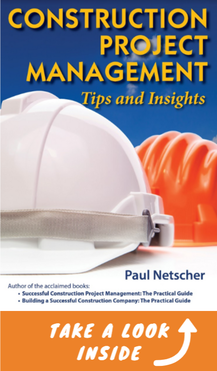

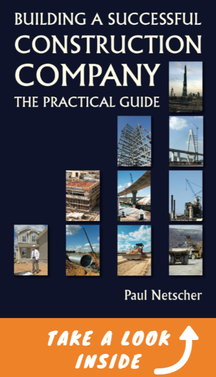

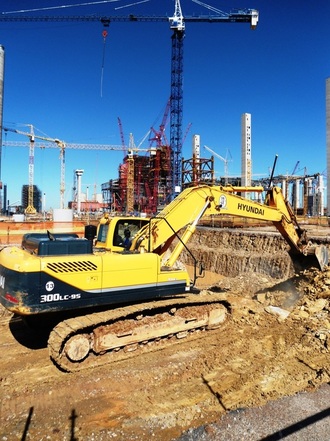


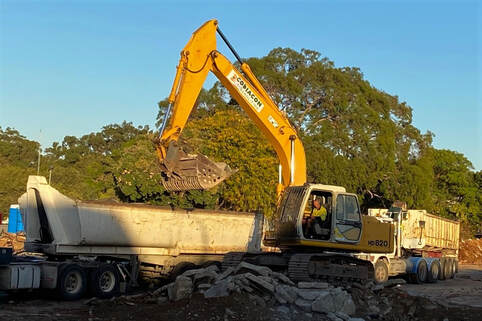
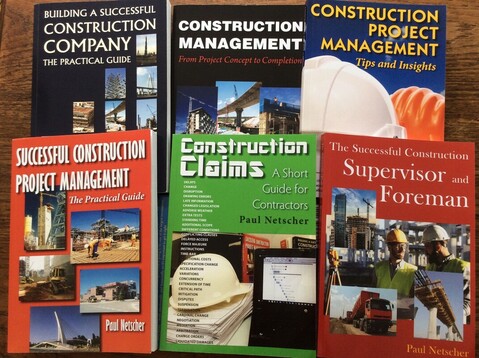


 RSS Feed
RSS Feed




